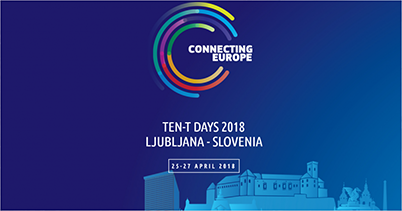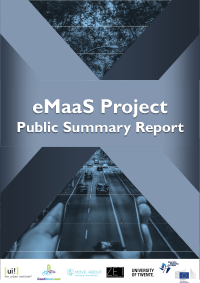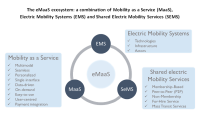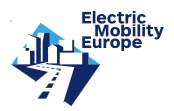Who are we?
eMaaS - Electric Mobility as a Service
What is the project?
Our project Electric Mobility as a Service (eMaaS) combines highly innovative technology and new business models to create the conditions for large scale adoption of Electric Vehicles (EV). We can achieve this by enabling sharing of EVs thus optimizing their utilization and reducing cost. This combination will make EVs functionally and cost equivalent to Internal Combustion Engine Vehicles (ICEV) by replacing individual ownership of vehicles with shared EVs which are utilized on-demand, as a service. "Sharing" will become the underlying principle of enterprise mobility. In addition, we connect EV sharing services to other eco-friendly modes of mobility. Finally, we put our users at the centre and work towards easily accessible solutions.
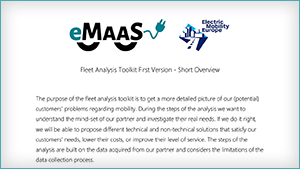 Introducing the Fleet Analysis Toolkit -
UI Hungary has developed the first version of the Fleet Analysis Toolkit that will help municipality customers to understand and optimize their fleet operation as the basis of transformation to electromobilty.
Introducing the Fleet Analysis Toolkit -
UI Hungary has developed the first version of the Fleet Analysis Toolkit that will help municipality customers to understand and optimize their fleet operation as the basis of transformation to electromobilty.
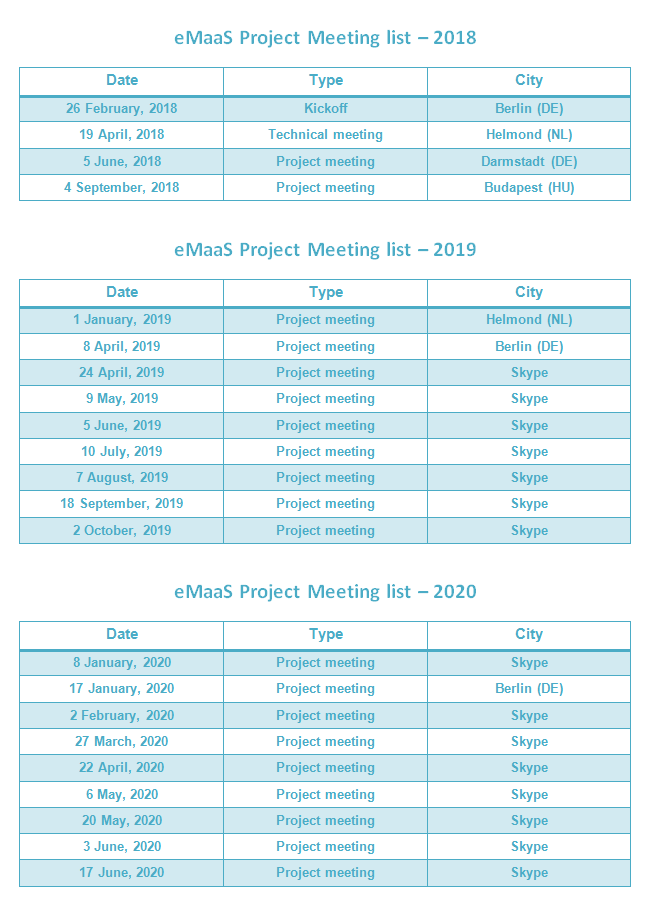
This report highlights results of the eMaaS project, which ran from January 2018 until June 2020. The eMaaS project is part of the ERA-NET Co-Fund Electric Mobility Europe . The programme has the goal to advance adoption of electric mobility in Europe. In the eMaaS project, we do this by combining innovative technology and new business models to create the conditions for large-scale adoption of Electric Vehicles, which are becoming more and more cost competitive. The consortium consists of European mobility SMEs: the Urban Institute (DE & HU), GoodMoovs (NL), Move About (SE) and ZET (AT), supported by the University of Twente (NL). Our aim is to make eco-friendly mobility more accessible.
The goals of eMaaS are four-fold:
- Increase user motivation & empowerment
- Improve standardisation in an accessible and open manner
- Realise integration between different systems and services
- Create valuable propositions for data sharing and visualisation
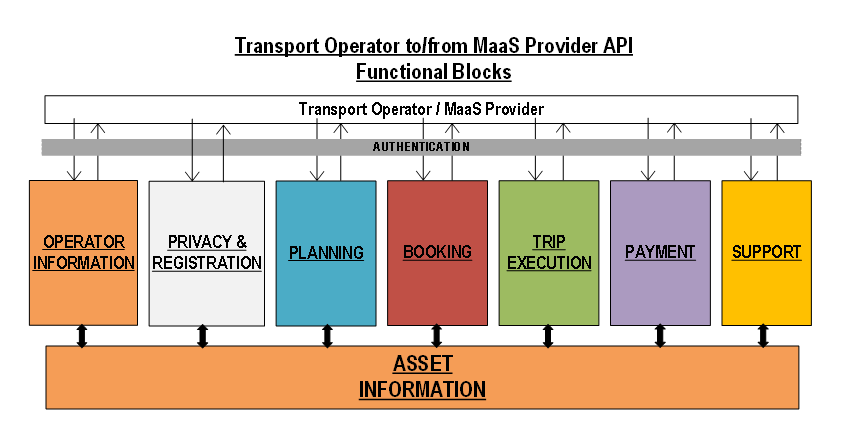 Progress Report of the eMaaS Consortium for 2019
Progress Report of the eMaaS Consortium for 2019
The eMaaS (Electric Mobility as a Service) solution is a suite of management functions which both enables the shared usage of e-mobility, fleet management functions (routing & scheduling, maintenance management, billing etc) and integration of existing mobility applications.
The following report gives a summary of the results achieved in 2019 by the eMaaS consortium.
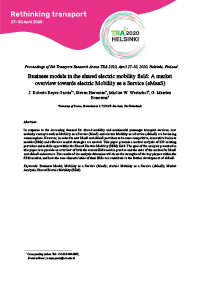 Although TRA2020 Rethinking transport conference was cancelled due to COVID-19, eMaaS authors published their paper: Business models in the shared electric mobility field: A market overview towards electric Mobility as a Service (eMaaS).
Although TRA2020 Rethinking transport conference was cancelled due to COVID-19, eMaaS authors published their paper: Business models in the shared electric mobility field: A market overview towards electric Mobility as a Service (eMaaS).
In response to the increasing demand for shared mobility and multimodal passenger transport services, new mobility concepts such as Mobility as a Service (MaaS) and electric Mobility as a Service (eMaaS) are becoming commonplace. However, in order for new MaaS and eMaaS providers to become competitive, innovative business models (BMs) and effective market strategies are needed. This paper presents a market analysis of 229 existing providers and mobile apps within the Shared Electric Mobility (SEM) field. The goal of the analysis presented in this paper is to provide an overview of both the current BMs used in practice and the state of the market for MaaS and eMaaS endeavours. The results of the analysis determine which are the strengths of the key players within the SEM market, and how the core characteristics of their BMs can contribute to the further development of eMaaS.
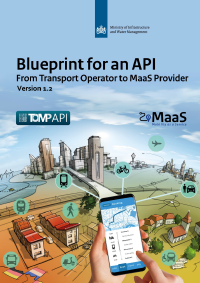 On the 1st of March 2020 the second version of the TOMP API was released.
On the 1st of March 2020 the second version of the TOMP API was released.
The eMaaS project has adopted the TOMP API as eMaaS partners: [ui!] and the University of Twente, are active collaborators of the TOMP working group and GoodMoovs is currently developing a first version of the TOMP API to enable roaming between e-mobility operators. Check out the blueprint of the TOMP API version 1.2 in the attachment.
 Publication in the World Electric Vehicle Journal by eMaaS authors:
Publication in the World Electric Vehicle Journal by eMaaS authors:
State of the Art of Mobility as a Service (MaaS) Ecosystems and Architectures—An Overview of, and a Definition, Ecosystem and System Architecture for Electric Mobility as a Service (eMaaS)
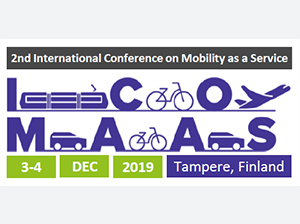 The eMaaS project was present at the 2nd International Conference on Mobility as a Service (IcoMaaS 2019) in Tampere, Finland on the 2nd and 3rd of December 2019.
The eMaaS project was present at the 2nd International Conference on Mobility as a Service (IcoMaaS 2019) in Tampere, Finland on the 2nd and 3rd of December 2019.
Roberto Reyes from the University of Twente presented the paper: From Shared electric Mobility Providers (SeMPs) to electric Mobility as a Service (eMaaS) players – A first approach to assess the Technical Level of Integration of Mobility Service Providers’ functionalities applied to the European (e)MaaS market.
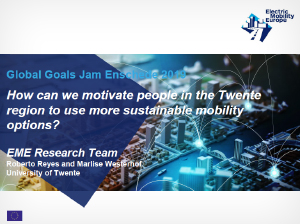 eMaaS participates in UN Global Goals Jam
eMaaS participates in UN Global Goals Jam
On the 18th and 19th of September, the eMaaS team from the University of Twente presented a case for the United Nations - Global Goals Jam (GGJ2019) in Enschede, NL. The participants of the GGJ2019 were challenged to come up with mobility concepts that further exploit the utilisation of EVs and electric Mobility as a Service. Find presentation in the attachment.
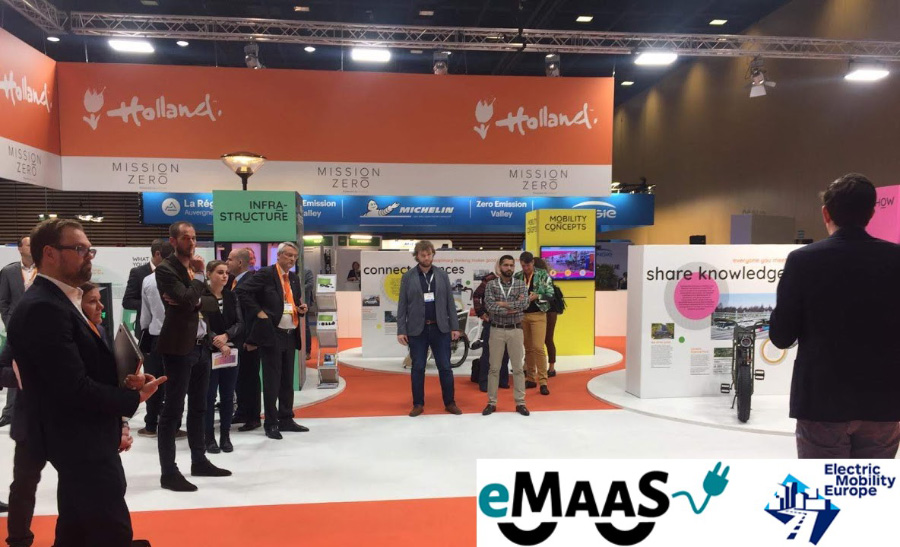 32nd EVS Conference in Lyon
32nd EVS Conference in Lyon
At EVS 32, the eMaaS project was presented with two short pitches in the Holland pavilion. Furthermore leaflets of the project were available for delegates of the conference
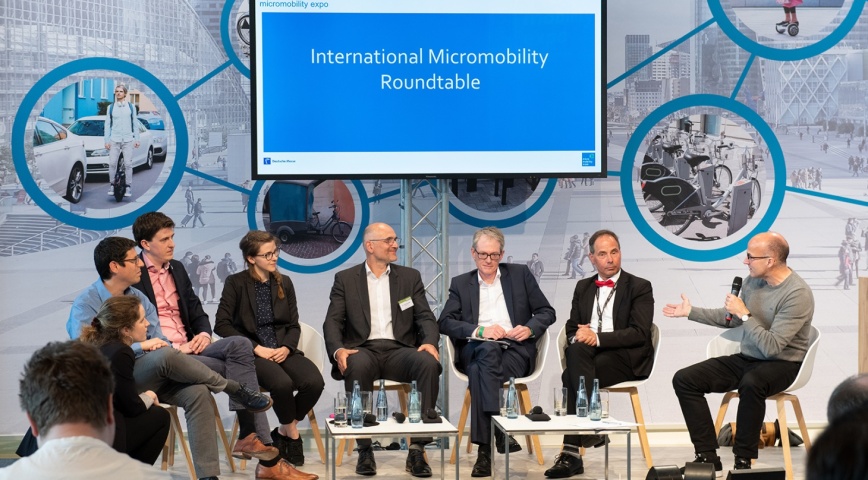 International Micromobility Roundtable
International Micromobility Roundtable
Steven Haveman of the University of Twente joined an international roundtable at the MicroMobility Expo in Hanover. Steven gave a pitch on the rise of electric mobility and the challenges within this field to achieve interoperability. An analysis of current electric providers on the market of MicroMobility was shown. After that, a panel discussion with other presenters was held in which further views for the adoption of MicroMobility were shared.
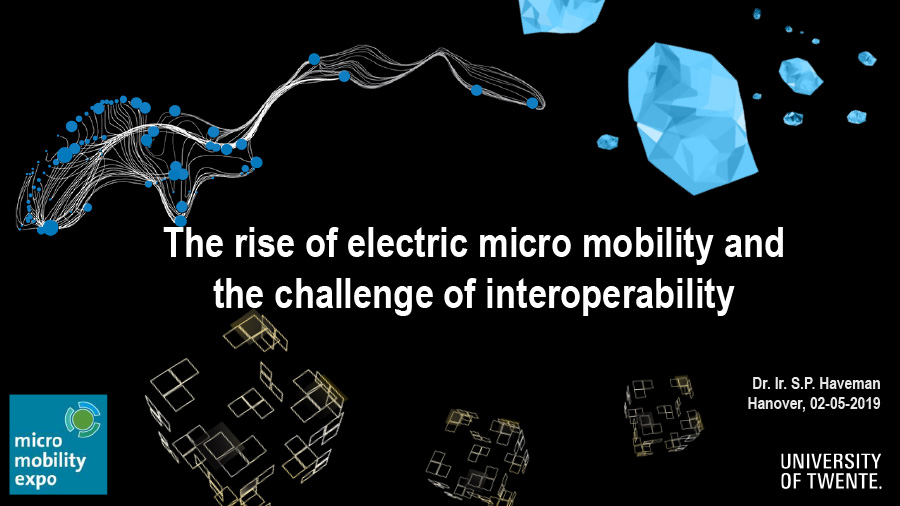 Several problematic cases were highlighted but current efforts towards a solution in interoperability were also presented.
Several problematic cases were highlighted but current efforts towards a solution in interoperability were also presented.
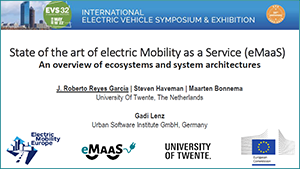 State of the art of electric Mobility as a Service (eMaaS): an overview of ecosystems and system architectures. You can download the award winning article (and the presentation) of J. Roberto Reyes García, Gadi Lenz, Steven Haveman and G. Maarten Bonnema. The article was published and presented on 32nd EVS Conference in Lyon.
State of the art of electric Mobility as a Service (eMaaS): an overview of ecosystems and system architectures. You can download the award winning article (and the presentation) of J. Roberto Reyes García, Gadi Lenz, Steven Haveman and G. Maarten Bonnema. The article was published and presented on 32nd EVS Conference in Lyon.
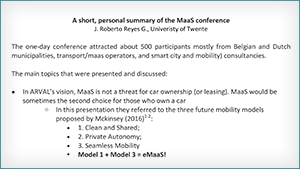 MaaS Conference Rotterdam - if you would like to know what the Dutch and Flemish experts were discussing, please download this short summary.
MaaS Conference Rotterdam - if you would like to know what the Dutch and Flemish experts were discussing, please download this short summary.
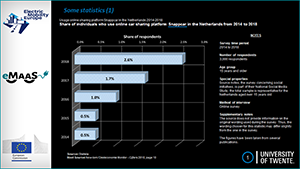 Car sharing market - University of Twente (NL) is working on the market analysis. In this presentation you will find some very interesting statistics about the European Car Sharing market.
Car sharing market - University of Twente (NL) is working on the market analysis. In this presentation you will find some very interesting statistics about the European Car Sharing market.
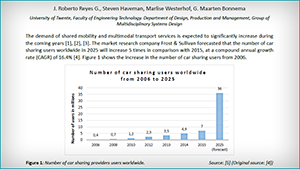 New business models and market analysis towards electric Mobility as a Service (eMaaS) -
New business models and market analysis towards electric Mobility as a Service (eMaaS) -University of Twente (NL) - J. Roberto Reyes G., Steven Haveman, Marlise Westerhof, G. Maarten Bonnema
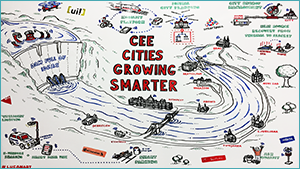 Central and Eastern Europe will be an important market for Electromobility -
Central and Eastern Europe will be an important market for Electromobility -This funny graphics that was produced in a Budapest meeting organized by [ui!] Hungary shows how this region of Europe is catching up with smart city solutions, including Electromobility and sharing economy.
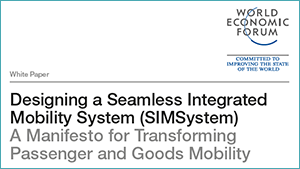 On the last World Economic Forum meeting in Davos, a report was preseneted together with Deloitte, on the Future of Mobility (FoM). It was received with substantial interest, as it seems that few things matter as much in the world as mobility. The way people and goods move about, however, is being radically transformed. A confluence of trends, both technological and social, is driving the emergence of a new mobility ecosystem. What we plan to do in the eMaaS project fits directly into what the World Economic Forum promotes that is to develop a future vision and strategy for a more seamless and integrated mobility system to transport."
On the last World Economic Forum meeting in Davos, a report was preseneted together with Deloitte, on the Future of Mobility (FoM). It was received with substantial interest, as it seems that few things matter as much in the world as mobility. The way people and goods move about, however, is being radically transformed. A confluence of trends, both technological and social, is driving the emergence of a new mobility ecosystem. What we plan to do in the eMaaS project fits directly into what the World Economic Forum promotes that is to develop a future vision and strategy for a more seamless and integrated mobility system to transport."
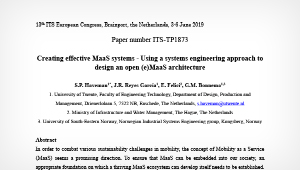 Eindhoven - April 18, 2019
Eindhoven - April 18, 2019
Steven Haveman of the University of Twente presented a paper called “Creating effective MaaS systems - Using a systems engineering approach to design an open (e)MaaS architecture” at the ITS EU congress in Brainport Eindhoven. The paper and presentation focused on providing support to that MaaS can be embedded into our society. In order to do this, an appropriate foundation on which a thriving MaaS ecosystem can develop itself needs to be established. The paper presents the use of a Systems Engineering approach to design a MaaS system architecture that can provide this foundation. We elaborated on two example cases to demonstrate and evaluate this approach. The first case comprises an overall architectural design for a MaaS system focusing on a functional decomposition, whereas the second case provides a functional design of an Application Programing Interface (API) for communication between MaaS Provider and Transport Operator. In the end, it is concluded that a systems approach can be beneficial to establish an effective MaaS ecosystem.
What is the core of the project?
In Sweden we will implement and test the solution in two city clusters focusing on municipalities and corporate fleets. The Mobility on Demand programs of the clusters will be linked to the overall solution. The first corporate cluster is around Gothenburg, Westcoast and Stockholm region. The second one is a cluster of the municipalities Lund, Tranås, Varberg, Trollhättan, Mölndal and Knivsta.
The eMaaS solution makes EV sharing in Austria more accessible and support multi-modal integration. The main task is to expand the current EV fleet of local partners by encouraging a wider use of electric vehicles.
Testing and rolling-out new functionalities in practice is the main objective in the Netherlands. We want to unite the fragmented e-mobility solutions by offering bikes as well as cars and public transport options. Thereby, we want to increase the attractiveness of eco-friendly mobility. In Hungary eMaaS will enable the local fleet of the city of Zalaegerszeg to share EVs. The cloud-based solution will be adapted for the specific needs in Hungary. They will develop a localization toolkit for local markets. Therefore, they enable the solution to be used in other countries as well.
The four pilots are supported by the University of Twente, who make sure of the user friendly design of the solution and define measurements for evaluation.
What is new?
To achieve our goal of increasing the adoption of electric vehicles, we use the combined knowledge of our partners to analyse and demonstrate a cloud-based solution run on an open urban platform. This kind of platforms allows with its interface architecture the addition of legacy systems and thus enables corporate fleets to offer sharing schemes. This will include EV fleet management applications that both enable sharing of EVs between fleet users and provide a range of fleet management functions. Including real-time routing, scheduling, operator matchmaking maintenance planning and billing. We integrate with our solution advanced vehicle telemetry to provide real-time accurate battery usage, location and routing.
We will also innovate the business model to allow EVs to directly compete with ICEV and offer attractive mobility solutions. The toolkit is a comprehensive suite of cloud based fleet management applications that allows existing SME providers of EV fleets (current EV fleet market is dominated by SMEs) to enjoy the same management functions as existing large scale ICEV fleets and thus reducing operational costs and providing equivalent service performance. Finally, the pilots showcase is the ability to offer similar eMaaS services across the EU, due to the common solution, creating further scale and supporting international fleets & journeys.
13rd May, 2019 - Warsaw, Poland
Olaf Bender from [ui!] urban institute presented the eMaaS concept on a workshop on the R&I Projects Midterm Event in Warsaw, Poland. Find presentation in the attachment.
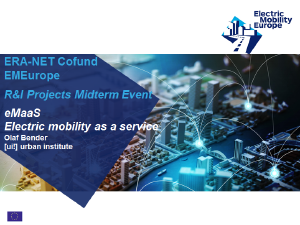
13/09/2019
Introduction of the eMaaS project
Peter Bakonyi Ph.D
Urban Institute Zrt, Hungary
The presentation gave an overview about the eMaaS project and the Hungarian pilot solution.
Workshop and Exhibition, 19/09/2019
Presenting: eMaaS - Electric Mobility as a Service
Gergely Gulyás
Urban Institute Zrt, Hungary
The 2019 E-mobility Forum provided a platform for decision-makers and market actors to connect and to advance the cause of urban e-mobility solutions. The Urban Institute Hungary presented the eMaas project at this event, gaining national and international interest for the Budapest Pilot project.
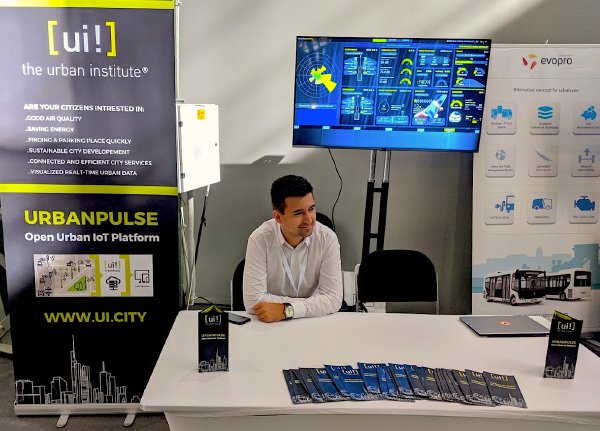
J. Roberto Reyes García and his co-authors Gadi Lenz, Steven Haveman, G. Maarten Bonnema have won the best paper award on the 32nd Electric Vehicle Symposium in Lyon, held on 19-22 May. They are all members of the eMaaS team, Roberto and Steven from Twente University (Holland), Gadi from Urban Software Institute (Berlin) and Maarten from University of South-Eastern Norway (Kongsberg). The title of the paper: State of the art of electric Mobility as a Service (eMaaS): an overview of ecosystems and system architectures.
EVS (Electric Vehicles Symposium, www.evs32.org) is the leading international event to address the issues of sustainable mobility by exploring how electrification, connectivity and driverless vehicles will be used in future mobility, together with the related business models and issues surrounding social acceptability.
Mobility as a Service (MaaS) is a concept that aligns with both current and future mobility demands of users, namely intermodal, personalized, on-demand and seamless. Although the number of shared mobility, electric mobility and multimodal passenger transport users is rapidly growing, until now, the list of MaaS and electric Mobility as Service (eMaaS) providers is quite short. This could partly be explained by the lack of a common architecture that facilitates the complex integration of all actors involved in the (e)MaaS ecosystem. In this paper we first review the state of the art of (e)MaaS ecosystems and architectures. Secondly, we propose an eMaaS ecosystem and an innovative eMaaS architecture that focuses on the integration of MaaS and electric mobility systems. With this work, we aim to support the further development of eMaaS.
The University of Twente team, the university partner of the eMaaS consortium wrote in collaboration with [ui!] about the eMaaS ecosystem and eMaaS system architecture. The paper will be presented on the 32nd Electric Vehicle Symposium (EVS32) Lyon, France, May 19 - 22, 2019. The authors are: J. Roberto Reyes García, Steven Haveman, G. Maarten Bonnema, (University of Twente, Holland), Gadi Lenz ([ui!]). In the paper the authors review the state of the art of (e)MaaS ecosystems and architectures. Secondly, they propose an eMaaS ecosystem and an innovative eMaaS architecture that focuses on the integration of MaaS and electric mobility systems.
You can download the presentation abstract from here and upon request (s.haveman@utwente.nl) we can send you the full presentation.
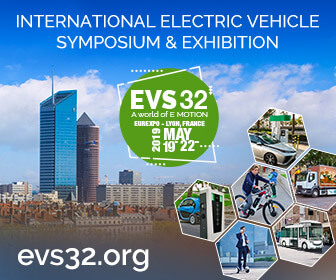
Date: 12 February, 2019
University of Twente one of the top technical universities in the Netherlands is a consortium partner of the eMaaS project. The Faculty of Engineering Technology, Department of Design, Production and Management is responsible among others to make sure that the final eMaaS solution serves the needs and expectations of the end users. J. Roberto Reyes from the Twente University will present the first results of the market analysis for eMaaS at the MaaS conference.
The organizers about the conference:
Mobility as a Service. By now, almost everyone realizes that this innovative mobility concept is the way of the future. Ambitious plans and words of praise abound. And major steps are indeed being made: the seven regional MaaS pilots are beginning to take shape, apps are evolving and there is an increasing willingness among parties to cooperate. However: there is still plenty of work left to do. On Tuesday the 12th of February, MaaS Congres 2019 will pick up where the successful 2018 edition left off. The aim is to move beyond intentions and allow for the realisation of real advancements.
Venue: The Doelen, Rotterdam
http://www.maascongres.nl/en/
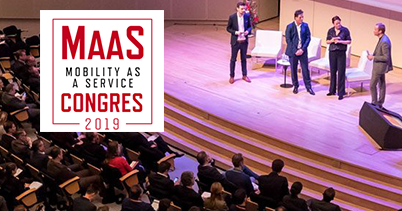
One of our Consortium Partners, GoodMoovs, asked to Present at WoCoMoCo Conference
On 5th, 6th and 7th November, the Swiss Mobility Academy will be hosting its 6th World Collaborative Mobility Congress – "WoCoMoCo" – in Rotterdam, Netherlands. Key players from all over the globe gather here to exchange their views and present their latest innovations in the thriving markets of car-, ride- and bike-sharing.

One of our consortium partners, GoodMoovs, was asked to present the eMaaS project during the WoCoMoCo in Rotterdam. Mr. Flip Oude Weernink CEO of GoodMoovs will present the current status of our project, the relation to the MaaS pilots in NL and the role of GoodMoovs in this.
It is worth to have a look at the conference program.
Date: 22 April, 2018
Urbis Smart City Fair in Brno (Czech Republic) is a unique space for sharing ideas and practical designs on how to bring to life and develop the concept of a smart city in central European towns and villages. Several thousand participants from the region have exchanged ideas in the workshops and visited the exhibition.
UI Hungary ran a booth and delivered a lecture about Urban Pulse and its role in the eMaaS project and its role in the planned electro mobility solution. The audience of about 80 people was interested in our topics as it was visible from the number of questions.
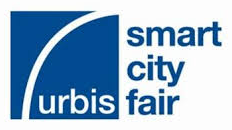
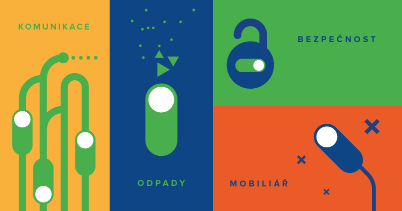
Date: 25-27 April, 2018
Public and commercial fleets have not yet endorsed eMobility in large. Main reason is the affordability due to the high cost of the vehicles and the low usage within fleets. eMaaS intends to break even by providing fleets with a sharing service suitable to public and commercial fleets overcoming the hurdles of today. The project is part of a larger initiative called EV4SCC within the Action Cluster “Sustainable urban Mobility”. The eMaaS presentation was held by Donát Dékány, from UI Hungary, one of the members of the eMaaS consortium.
2018 TEN-T Days conference and exhibition in Ljubljana in Aprils 2018 showcased innovative projects and ideas that contribute to the development of the European transport infrastructure and mobility services. The indoor exhibition and connected conference welcomed about 100 exhibitors showing innovative transport solutions. Topics included future mobility - electric vehicles and chargers, ITS and alternative fuels and projects supporting this mobility with rail, maritime, IWW and road transport infrastructure. There was a high-level Interinstitutional meeting to discuss further synergies between transport, energy and digital connectivity, and the investment support with highest EU value-added in the post-2020 framework.
